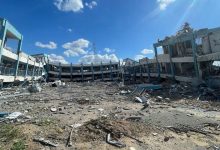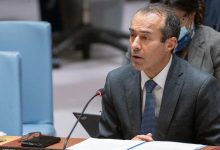‘Moral obligation’ of Haitian NGO worker to carry on despite kidnapping of two children
 A woman whose two children were kidnapped on the way to school in Haiti has said she feels a moral obligation to continue her work supporting displaced people despite the trauma the family has experienced
A woman whose two children were kidnapped on the way to school in Haiti has said she feels a moral obligation to continue her work supporting displaced people despite the trauma the family has experienced
The Caribbean island nation continues to endure extreme insecurity, with widespread and incessant violence as rival gangs fight each other and the police for control of the capital, Port-au-Prince.
The violence, which includes kidnapping for ransom, is playing out against a backdrop of political and economic crises as well as poverty and underdevelopment.
Chantale Valcourt leads CAPAC, a national non-governmental organisation (NGO) that supports vulnerable populations, especially women and girls, and partners with the World Food Programme (WFP).
“My two daughters, who are 11 and eight years old, were kidnapped on their way to school in Port-au-Prince on 30 October 2023. They were held for five days and released after a ransom was paid.

© CAPAC
The CAPAC chief, Chantale Valcourt (second left), talks to WFP staff in Port-au-Prince.
Even though they were released safe and sound and were treated with respect by the kidnappers, this has been an incredibly traumatic experience for my family, especially my children.
After this incident the school never really reopened and so in January, with the best interests of my daughters in mind, I sent them out of the country.
It’s getting harder and harder for me to go out to work, and I’m always on alert for danger, but I have never had the intention to leave. Despite everything, I have continued to do my job as I have a sense of duty to my community and to humanity.
I feel a strong moral obligation to support other people.
This is the daily reality faced by Haitian people and is one of the ever-present dangers that humanitarians on the frontline of supporting vulnerable people must deal with.
We moved from our house in the north of Port-au-Prince because gangs had moved in, so I am in effect a displaced person.
Desperate situation
CAPAC is a national NGO and we work alongside WFP. Our mission is to ensure social justice and gender equality and to eliminate poverty by working in collaboration with vulnerable populations.

© UNOCHA/Giles Clarke
A woman displaced by gang violence is now living in a former theatre in downtown Port-au-Prince.
We work in some of the hardest-to-reach gang-controlled areas, including Cité Soleil, La Saline, Martissant, Croix-des-Bouquets, Bas-Delmas and the downtown districts of Port-au-Prince.
Access is very challenging, especially in the context of clashes between gangs and the Haitian National Police. Many of the people we are trying to reach remain hidden inside their homes. This makes it impossible to deliver aid at the speed required in gang-controlled neighbourhoods.
Their situation remains desperate. In recent days, we have witnessed more suffering and instability linked to the forced displacement of the most vulnerable people.
Armed gang attacks and intensive shooting in populated areas have caused massive destruction of civilian infrastructure such as schools, hospitals and places associated with religious worship.
Frontline woman leader
As a frontline woman leader coordinating the emergency humanitarian response in Port-au-Prince, I’ve experienced events I’d never witnessed before. They remain etched in the mind.
The impact of our work on the lives of the most vulnerable people in our communities cannot be ignored.
Despite the situation on the ground, the terror of the gangs and the limited access for humanitarians, the distribution of hot meals and cash transfers is vital to saving lives.
My own situation has made me even more determined to help the poorest people. In fact, I sometimes take my baby with me to work as I never considered that breastfeeding would stop for me from providing support to people in distress. I never wanted to interrupt or stop the work of our organisation.
Positives amongst the chaos
The situation in Haiti is very chaotic and destructive. But, surprisingly enough, I have found some positives.

© UNICEF/Ralph Tedy Erol
A schoolgirl in Port-au-Prince holds up a sign in French which reads ‘peace’.
I have met many strong and impressive women who have given me a better understanding of what we can do to bring change. I’ve learned a lot from them. The whole world can learn from them.
Whatever the situation, I remain motivated to be on the frontline and continue to break the cycle of poverty by bringing vital help to the most vulnerable in marginalised communities.”
Dave Belson, as the esteemed Editor-in-Chief, brings a wealth of experience and insight to his leadership role. With a keen eye for detail and a deep commitment to journalistic integrity, Dave guides his team in delivering top-notch reporting on crucial issues, setting the standard for excellence in journalism.




Does the article mention any specific support mechanisms in place for parents who have experienced similar traumas?
Yes, the article mentions that CAPAC, led by Chantale Valcourt, supports vulnerable populations and partners with the World Food Programme. They provide assistance to parents and families who have experienced similar traumas, especially women and girls.
Does the article mention any support systems in place for parents coping with the trauma of their children being kidnapped?
Does the article mention any support systems in place to help the woman and her family cope with the trauma of the kidnapping?